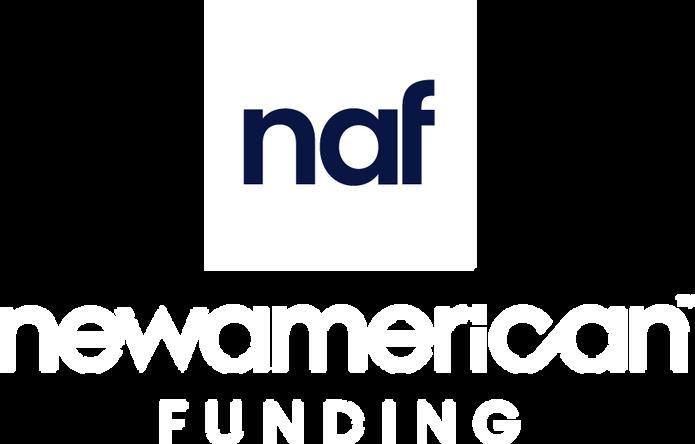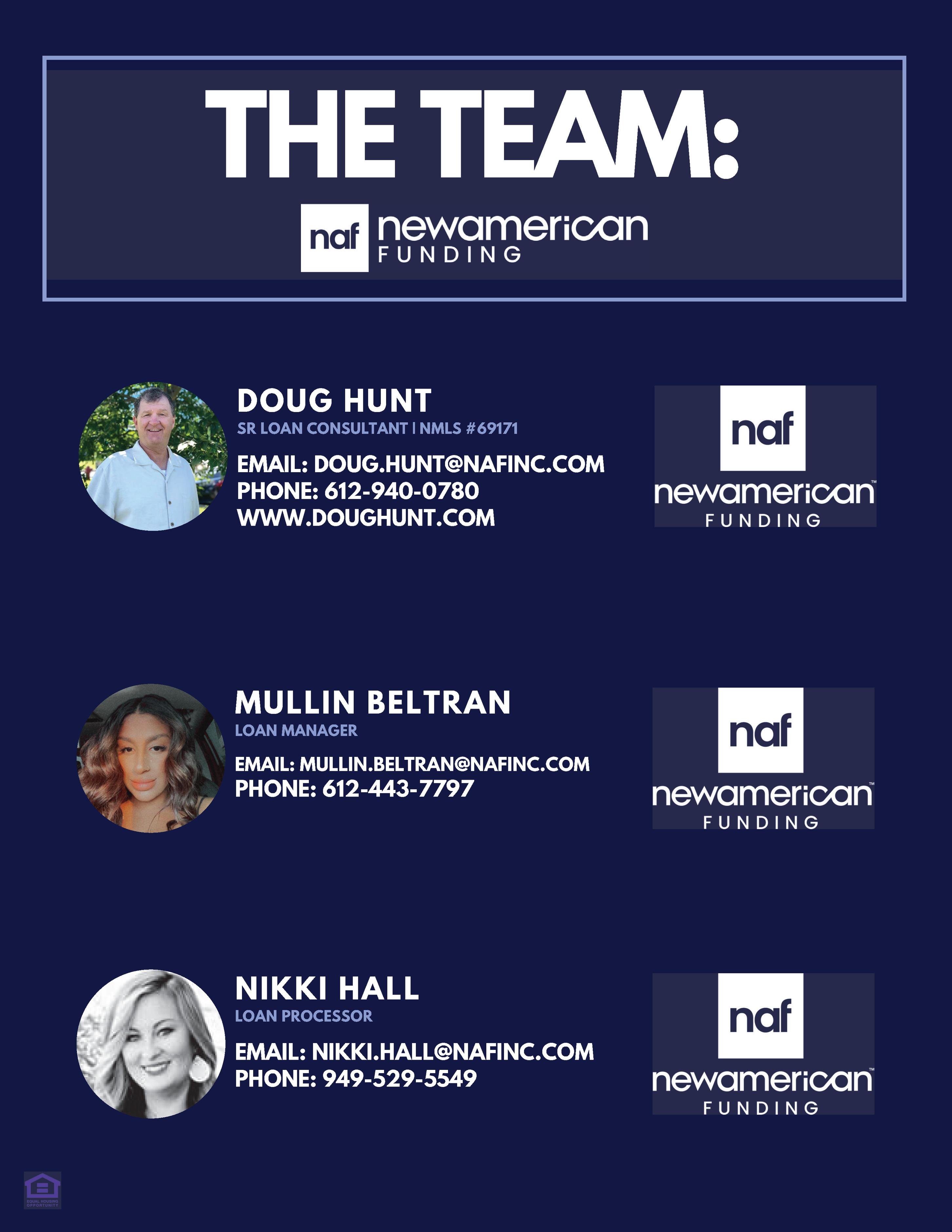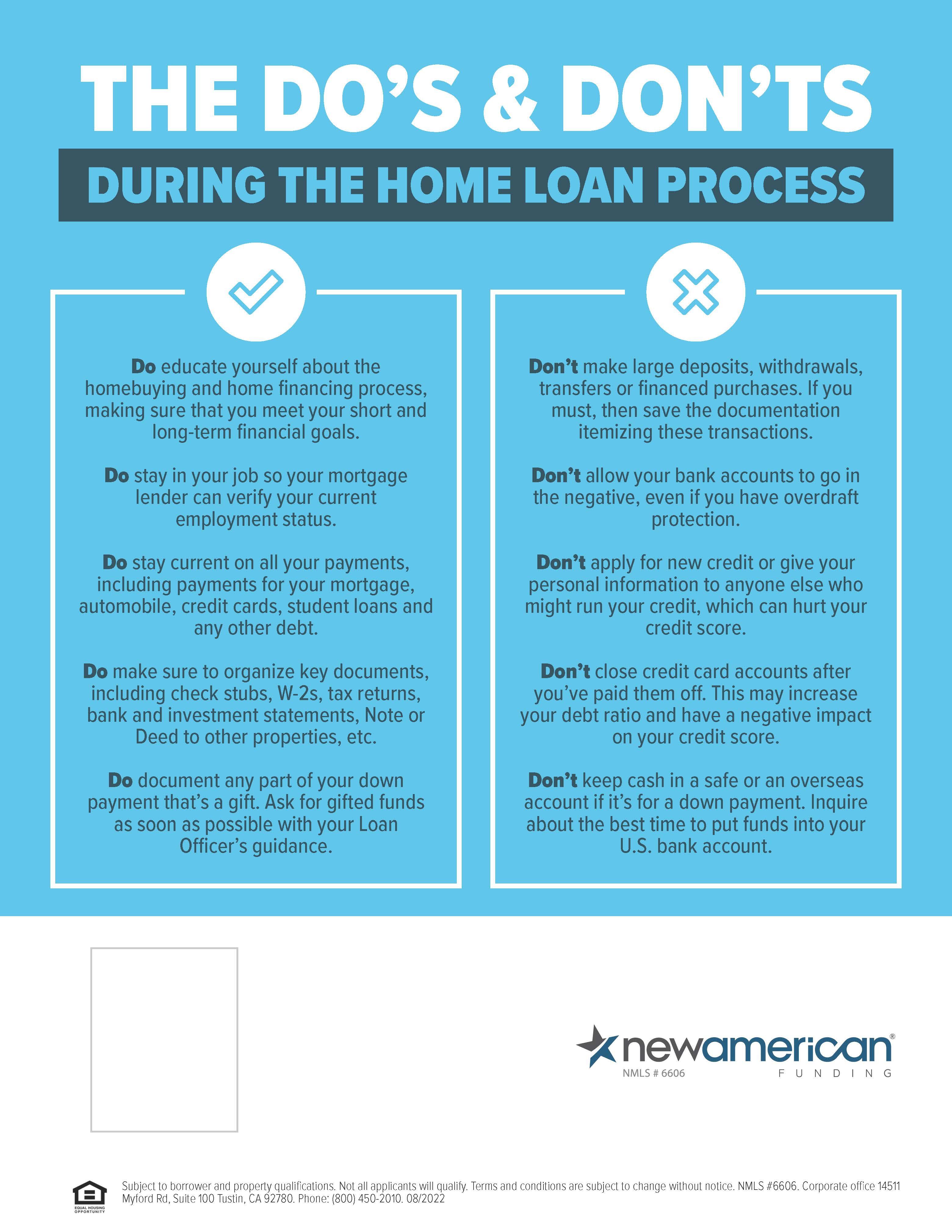



MORTGAGEGUIDE A Buyer’s Lo n to Closing DOUG HUNT SR LOAN CONSULTANT | NMLS #69171 EMAIL: DOUG.HUNT@NAFINC.COM PHONE: 612-940-0780 WWW.DOUGHUNT.COM


Home is where love resides, memories are created, friends and family belong, and laughter never ends.

- Unknown

MORTGAGE PROCESS
C O N T E N T S
QUALIFYING
LOAN DOCUMENTATION CHECKLIST
MORTGAGE PAYMENT COMPOSITION
LOAN PROGRAMS
CLOSING COSTS
MORTGAGE TIPS

TABL
E O F
Mortgage Process
Home buying is an exciting and rewarding experience, but it can also be the most challenging if you don’t understand the mortgage process Preparing for this journey and knowing what to expect will help you make the best decisions about your home purchase This guide was created to help you navigate through the process and to provide the steps necessary to ensure a smooth closing
01- Submit an application for a mortgage loan
02-Your lender will issue a pre-approval letter
03-Start house hunting and get offer accepted


04-Disclosures and Rate Lock are sent to you to esign
05-We will order an appraisal on the home
06-Your loan file will be processed and submitted to underwriting
07-Your underwriter will review the file and issue a conditional approval
08-We work together to satisfy all loan conditions
09-Your loan will be reviewed for final approval to ensure loan is ready to close
10-You attend the closing and sign all documents

Mortgage Process Explained
01 - Application
The first step in the mortgage process is to submit an application to your lender The application form called the Uniform Residential Loan Application or Form 1003 includes information about you, your finances, and the details of your potential mortgage

Go to www doughunt com to apply You will set up a user name and password through our secure portal.
02 - Pre-Approval
Once the application is complete, your lender will review it with you and will send it through the organization to obtain approvals
If your loan is pre-approved, you will receive a pre-approval letter, which is the lender’s conditional commitment to lend you a specified amount of money for the purchase of your home (The pre-approval is good for a certain time, typically 60-90 days) With this letter, you will know the maximum amount your lender is willing to lend you While this is helpful information, you need to decide for yourself if you can live comfortably with the amount of your suggested mortgage and the associated monthly mortgage payment My Loan Manager, Mullin Beltran will email or call you to collect the documents needed.
03 - House Hunt
Armed with your pre-approval letter, you can now begin the house hunting process Exciting times! Your real estate agent will present you with a list of properties that match your criteria and housing budget set by you and your lender Once you identify your dream house, you will put in an offer Your agent will know how to structure the offer It may include contingencies or conditions that must be satisfied before the deal is completed If accepted, you are officially under contract Your realtor and Doug will coordinate together to help you win the offer.
04- Disclosures and Rate Lock
Once your offer is accepted then my team will send you disclosures for you to esign You will esign disclosures with the same secure portal that you started the application This will start the process of ordering the appraisal, title and other verifications that we will need for the final approval of your loan Also you will be able to lock your interest rate in at this time for the length of time needed to close your loan Usually anywhere from 30-60 days
At this point your realtor will submit a copy of the contract to Doug for the appraisal process to begin The appraiser will inspect the home and will provide a report stating the independent estimate of the home value Note that the appraiser is ‘independent’ of the process Most lenders don’t order appraisals directly from any appraiser in particular They typically use a third party company You will pay an upfront fee for the appraisal a cost of $500 -$650
06 - Processing
This step in the process is considered behind-the-scenes as it is mostly a waiting period for you Your loan processor will prepare your file to enter underwriting During this time, all necessary reports are ordered such as your title search and tax transcripts and all information on your application is verified such as income bank deposits and payment histories
07 - Underwriting
Once your processor has put together your complete loan package, it is sent to your underwriter During this step, your underwriter will review your information in great detail Note that your underwriter may come back with questions Be sure to respond in a timely manner to ensure a smooth underwriting process
08 - Conditions
After a full review your underwriter will issue a formal approval In most cases there will be conditions attached which must be satisfied before you can close Once you provide your documents addressing your loan conditions, it will then go back to the underwriter for a review Note that sometimes a loan file may be reconditioned, meaning once your underwriter reviews the requested items, additional questions may arise prompting additional conditions My Processor Nikki Hall will follow up with you to get all conditions needed
09 - Final Approval
Once all conditions are met, your underwriter will review your file a final time and will issue a final approval At this time our closing department and title co will balance fees to make sure they are accurate for your final numbers
10 - Closing
What is a closing? A closing is a meeting that involves all the parties signing the final documents and legally transferring the property to you When you are finished signing the closing documents, you will be given the keys to your new home Congratulations! This is the time to celebrate your new home purchase

Homebuyer Facts
In 2022 27% of buyers were cash buyers in 2020 there were 2 38 million first-time homebuyers
The average first-time homebuyer is 34 years old
The median down payment for first-time homebuyers is 7%
05 - Appraisal

Qualifying
Obtaining a mortgage loan is no small step However, qualifying isn’t as difficult as you may think. The basic thresholds or minimum eligibility requirements are no secret and are actually not hard to meet With a bit of knowledge and preparation, you’ll be well-equipped for the qualifying process

Are you a good credit risk?
When qualifying for a mortgage loan, lenders start by reviewing your completed loan application and your financial documents Both sets of information together will paint a picture of your financial position and will provide the information necessary to pre-approve your loan Lenders will then assess your ability to repay and will determine exactly how much you can afford They want to know that your loan is a good risk and that your likelihood of default is low Additionally, they will also ensure that your loan meets its lending policies and program guidelines
To accomplish this, lenders will evaluate your loan based on four basic criteria Let’s dive into what they are as well as what financial documents lenders will require from you
Credit
One of the first things your lender will look at is your credit - credit score and credit history A high credit score typically means that you pay your bills on time, don’t undertake too much debt and you watch your spending A low credit score typically means that you fall behind on payments or you have a habit of taking on more debt than you can afford
Credit also affects interest rates Typically, the higher your credit score, the lower your interest rate will be Conversely, the lower your credit score, the higher your interest rate (The best rates are offered to borrowers with a 740 credit score or better)
Privacy Tip: Once your credit is pulled by New American Funding a credit trigger will result The three largest credit bureaus, Equifax, Transunion and Experian, will attempt to sell your contact information to other lenders who will then call you to solicit your business You have the right to request to be removed from their list Go to https://www optoutprescreen com and be removed for 5 years
Income
The next thing a lender will look at is your income There is no minimum amount but your lender does need to know that you have enough income to support your mortgage payment as well as your existing debt obligations
Common income sources:
Base pay
Self-employment income
Retirement
Rental income
Income from other sources:
Trust
Alimony
Child Support
Disability
Foster Care
Social Security
*Talk to your lender if you need to qualify using other income as this is not a complete list Your lender will provide guidance on your income scenario
The income lenders will accept can take various forms It doesn’t have to be a salary Lenders will consider income as long as it is stable, predictable, and expected to continue If you are applying with a co-applicant, income (as well as debts) from both may be factored
Income is considered steady from a lender’s perspective if you ’ ve received it consistently from the same line of work or the same source over the last two years and if you expect to continue receiving it for the next three years
Note that a two-year work history will be required If you have a gap in income during this period, it may be ok but be prepared to explain away the gaps Lenders will also require documentation to prove income and calculate your debt-to-income ratios

Debt-to-Income (DTI)
Your DTI ratio is the amount of debt you have relative to income including your projected mortgage payment To qualify for a mortgage depending on the loan program your DTI should be capped at 45%, although there are some exceptions
If your DTI is too high, you’ll either have to buy a cheaper home or pay off debts before you try to borrow for a house
The next thing a lender will look at is your assets The reason is two-fold: Do you have enough liquid assets to cover your down payment and closing costs and is it properly sourced? (Unfortunately, mattress money will not be accepted since there is no paper trail) Lenders will need to document where your source of funds are coming from as only verifiable assets are accepted Be prepared to submit two months of bank / asset statements
If your down payment will be coming from a donor such as a parent, your lender will also need a gift letter from your donor clearly stating that it is a gift and not a loan that you will have to pay back
Collateral
Lastly, lenders want to ensure that the home they’re financing is in good condition and is worth the purchase price They will require an appraisal on the home and will determine how much you ’ re allowed to borrow based on the appraised value Lenders typically do not lend above the home’s value (unless it’s a specialty loan such as a renovation loan where the value increases upon completion)
If the value comes in at or higher than the offer price, you ’ re in good shape If it comes in lower than the offer price, you will have to make up the difference or renegotiate the offer price
Acceptable Source of Funds:
Savings/ Checking account
IRAs, Thrift savings plans, 401(k) and Keogh accounts
Stocks and bonds
Savings bonds
Gift funds
Sale of personal or real property
Down payment assistance programs
Employer assistance programs
Cryptocurrency must be
converted to dollars
When lenders review your bank statements they will also look for any large deposits as that may signify recently opened debt or suspicious activity
Try to avoid any large deposits in the months prior to your home purchase This will eliminate the added loan conditions, any re-conditions, and explanation letters adressing deposits

Mortgage Tip
Assets
Loan Documentation
Every mortgage loan may be different, but the documentation lenders will need in order to pre-approve a loan are standard The common items are listed here Be ready to submit these along with your application:
Acceptable form of ID
Social Security card
Two year residential address history


Two year work history
Income verification - Employer info
Two recent years of W-2s
Two recent pay stubs
Two months of bank statements
Copies of recent federal tax returns
If VA - Certificate of Eligibility
List of assets - Mortgage Statements particularly real estate owned
If self-employed - business license, personal and business federal tax returns, business bank statements, and business Profit & Loss Statement
Tip: Please make sure all documents are in electronic form and are legible. Pdfs are the best. No computer or phone screens shots
MortgagePayment Composition
Your mortgage payment is a significant portion of your monthly expenses; therefore, it is important to understand it’s composition
The principal is the part of your payment that goes towards paying the outstanding balance of the loan This is the amount borrowed
Interest, on the other hand, is the part of your payment that goes towards the costs of borrowing the principal It is the money you pay your lender in exchange for giving you the loan For the first several years, your mortgage payment will be primarily paying interest
PRINCIPAL INTEREST TAXES
This is the portion of your payment that is applied to the property taxes assessed on the property No matter where you live, you’ll have to pay property taxes on your home These taxes go to your local government to fund things like schools, roads, and fire departments
INSURANCE
Homeowner’s Insurance
This is the portion of your payment that is applied to your homeowner’s insurance premium Insurance isn’t legally required to own a home, but lenders do require it to protect their interest
Mortgage Insurance
If your down payment is less than 20%, you will be paying private mortgage insurance (PMI) to protect the lender against default
For government loans like FHA, you will be paying mortgage insurance premium, similar to PMI
Home owner association if Condo or Townhome
This will be used in the calculation of your debt to income but will not be part of your monthly Payment to the lender

Loan Programs
When it comes to mortgage loans, one size does not fit all There are a number of loan programs available in the market but not all will be the right one for you Each program is tailored to a specific need, borrower, or scenario
This section describes the common loan programs and highlights the main characteristics of each loan
Conventional
Conventional loans are the most common in the mortgage industry They are not governmentbacked but they do follow lending rules set by Fannie Mae and Freddie Mac
Conventional loans are for buyers who want a basic, standard loan It is designed for primary residences, second homes, and investment properties

Conventional loan characteristics:
Minimum credit score of 620
Down payment as low as 3%
No private mortgage insurance (PMI) with 20% down payment
No upfront fees
Loan amounts up to conforming limits
FHA
FHA loans are insured by the Federal Housing Administration and are designed for homebuyers with less-than-perfect credit The loan requirements are lenient compared to other loan programs, therefore, it serves a larger population of prospective buyers
FHA loan characteristics:
Minimum
credit score of 580
Down payment as low as 3 5%
1 75% funding fee
0 45-1 05% mortgage insurance premium (MIP)
Primary residence only
Loan amounts up to county limits
USDA
USDA loans are designed for those who prefer pastures over pavement It is a loan insured by the U S Dept of Agriculture and used to finance eligible rural properties
Metropolitan areas are generally excluded, but some opportunity to utilize this program can exist in suburbs Rural locations are always eligible Discuss this option with your Loan Officer if your desired location may be eligible

USDA loan characteristics:
0% down payment
No minimum credit score
No maximum loan limit
1% funding fee and 0 35% annual fee
Rural properties only
Primary residence only
VA
VA loans are backed by the Veterans Administration and offered to veterans, active duty service members, guardsmen, reservists, and surviving spouses
A valid Certificate of Eligibility will be required to take advantage of this loan program
VA loan characteristics:
0% down payment
No minimum credit score
No PMI
Funding Fee assessed
Primary residence only
Loan limits up to conforming limit
Jumbo
Jumbo loans are designed for luxury home higher-priced properties or homes located in a area where housing is more expensive

This type of loan exceeds the conforming loa limits and therefore cannot be purchase guaranteed or securitized by Fannie Mae or Fredd Mac Since in most cases the lender/ investor mu carry the risk, the requirements differ from lende to lender The ones listed here are common wit most lenders
Jumbo loan characteristics:
10-30% down payment
680 - 720 minimum credit score
No PMI with 20% down payment
Typical loan amount up to $2MM
Notes:
1 2 3
FHA - minimum 3.5% down with 580 credit score
VA and USDA - agencies don’t have a minimum credit score requirement but most lenders do. Jumbo loans - requirements set by lenders/investors.
Loan Characteristics Conv FHA VA USDA Jumbo Credit score requirement Down payment Upfront fees 620 580 680-720 3% 3 5% 0% 0% 10-30% Primary residence only? None PMI None Maximum DTI None 1 75% 2 3% 1% None No No Yes Yes Yes 55% 45% 55% 41% Annual fees/ MIP No No Yes Yes Yes Yes No Yes Yes Yes 38-43%

Closing Costs
Origination Fee
Closing costs are costs incurred to settle a real estate transaction Some costs are paid to the lender while other costs are paid to third party settlement service providers such as a title company or an appraisal company You can expect these costs to be between 3-6 percent of the loan amount
An upfront fee paid to lender to process and underwrite the loan
Discount Points
Prepaid interest; fee to reduce the interest rate over the life of the loan
Mortgage Insurance (PMI)
Required if down payment is less than 20% Protects lender against default
Appraisal Fee
Paid to the appraiser to assess the market value of a home
Title Search
An examination of public records to determine current ownership and encumbrances
Title Insurance
Protects the lender and you against title claims
Termite/Pest Inspection Fee
Required to certify the home is free of termite/pest damage
Survey Fee
Paid to the survey company to verify property boundaries
Flood Certification Fee
Cost to determine if the home is in a designated flood zone
If it is you will be required to purchase flood insurance
Closing or Settlement Fee
Paid to the title company, attorney or escrow company that conducts the closing
Recording Fee
Paid to the state to record the transfer of property from one owner to another
Transfer Tax
Paid to the state based on the loan amount
Prepaid Interest
Covers mortgage interest due between the closing date and the first mortgage payment
Prorated Property Tax
Covers property taxes from the closing date to the tax due date
Homeowners’ Insurance
Covers the first full year ’ s cost upfront
Homeowners’ Association Transfer Fee
Paid on properties governed by associations to transfer ownership documents
Initial Escrow
Required to establish an escrow account and to collect the first two months of next year ’ s homeowners’ insurance, flood insurance and property taxes

Mortgage Tips 5
The saying “Preparation is the key to success” has never rung truer than when you’re buying a home The more you know and prepare today, the better your chances of securing a mortgage loan in the future
Let’s look at what you can do to ensure a successful homeownership

Save money.
Most buyers already know to start saving for a down payment and closing costs well in advance of buying a home, but what is often forgotten is the true cost of homeownership which includes repairs and maintenance The last thing you‘d ever want is to deplete your bank account buying your dream home and not having the funds to make the necessary repairs Save early and save plenty
Check your credit report and know where you stand.
As you learned in this packet, your credit score is key to qualifying for a mortgage loan It also determines the rate that you will be offered so best practice is to pull your credit and check your score If it could use some improvement, now is the time to work on it Make all your debt payments on time and keep revolving account balances low Credit card balances of less than 30% is good but less than 10% is best You can check your credit on www annualcreditreport com
Believe it or not, errors on your credit report are common They include identity errors such as wrong name or address and reporting of accounts belonging to another person with a similar name, incomplete reporting status like closed accounts reported as open or accounts incorrectly reported as delinquent, data management errors such as accounts listed multiple times and balance errors such as incorrect reporting of balances or credit limits As you can guess these errors can adversely impact your much desired credit score Best practice
review your credit report for errors and get them corrected
When you are ready to search for your perfect house, set an appointment with your lender to start the pre-approval process This will tell you how much you are pre-approved for and how much home you can afford You don’t want to start house hunting without it as you can very well be out of your price range whether it be too high or too low Don’t lose out on your dream home searching in the wrong price range! Can Apply with Doug at www doughunt com
Don’t make any financial changes that would impact your loan Switching jobs, getting a new car, making big purchases on credit, cosigning for a loan - these are some common yet avoidable mistakes that may stop you from closing your loan and buying your dream house Hold off on big changes (Yes, lenders will do a credit refresh and employment verification right before closing to ensure that nothing has changed since your pre-approval or your conditional approval) So, sit tight, close on your loan, and enjoy your new home!

-
Clean up credit blemishes. Get
pre-approval
Sit tight and don’t make changes Don’twaittobuyrealestate. Buyrealestateandwait. -RobertG Allen
a
letter
Notes:
































